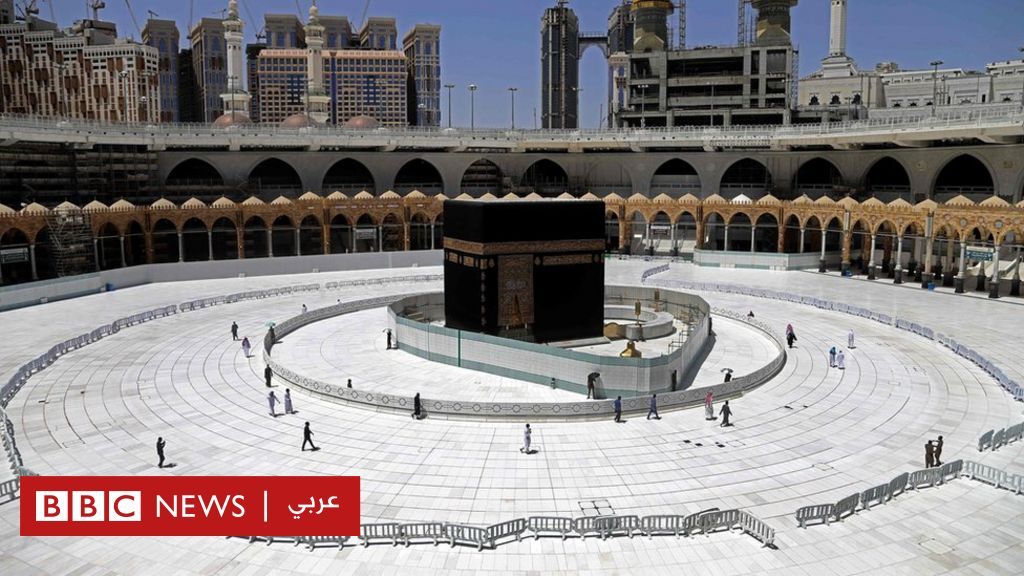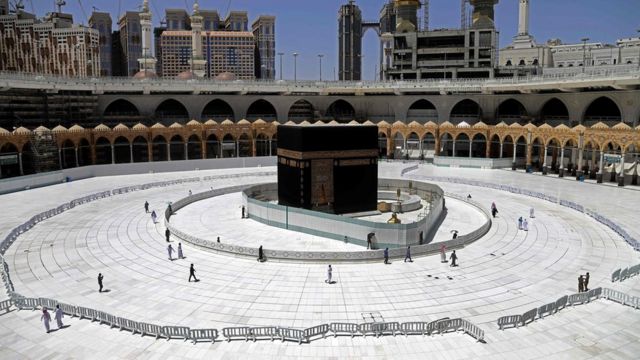
[ad_1]

Published image, AFP
About 1.8 billion Muslims around the world are receiving Ramadan this year at a difficult time due to the outbreak of the Corona virus that has clouded the atmosphere for Ramadan this year, according to Martin Bashir, editor of religious affairs at the BBC.
Most countries have taken precautionary measures to prevent the spread of the virus, so mosques have been closed and Tarawih prayers have been banned there, so they are now being held in homes.
It also prohibited evening gatherings of people at breakfast time and group breakfast banquets, in which they used to renew the bonds of friendship and social compassion between them and provide assistance and charity to the needy.
The Corona virus has affected the holiest Islamic sites, as the Grand Mosque in Mecca is silent, the Prophet’s Mosque in Medina is closed, and the doors of Al-Aqsa Mosque in Jerusalem are closed.
Strict measures taken to combat the spread of the epidemic have eclipsed the usual religious ceremonies and rituals during the month of Ramadan, which begins today in most Arab countries.
“A prayer to lift the affliction”
In Saudi Arabia, the Saudi monarch, King Salman bin Abdulaziz, expressed his hope that “God will lift the plague” which afflicts the kingdom and the world.
The Kingdom of Saudi Arabia had recently faced serious challenges from its regional competitors in the region, due to the Corona virus outbreak and collapsing oil prices.
The king had expressed in a previous written speech his “pain” for the closing of mosques during the month of Ramadan.
From the Great Mosque of Mecca, Saudi authorities organize Tarawih prayers which are broadcast to the Islamic world via television and the Internet, but without worshipers.
And in various parts of the Kingdom, many will be subject to a full state of lockdown, while residents of some areas will be allowed from 9 a.m. to 5 p.m. local time.
Saudi Minister of Health Tawfiq Al-Rabiah said in a speech broadcast on television: “We are in the same boat. We must enforce (rules) social distancing to prevent the virus,” indicating that the month of Ramadan is a month when social activities abound, expressing his hope that this month will be this year. Different by respecting preventive measures and social distancing.
‘Praying at home’
In Egypt, Sheikh of Al-Azhar Sheikh Ahmed Al-Tayeb called on Muslims to pray at home during the month of Ramadan with the continued closure of mosques as part of measures to stem the spread of the Covid-19 epidemic.
Al-Tayyib said: “Muslims welcome the blessed month of Ramadan this year with hearts filled with pain and sorrow due to cessation of prayer in mosques,” according to Egyptian Middle East News Agency .
Sheikh of Al-Azhar called on Muslims to “ignore all calls that claim that fasting weakens the human immune system”, noting that such calls are strange and unfounded, according to the agency itself.
Egypt’s mufti Dr Shawky Allam said earlier that fear of a Covid 19 outbreak is no excuse for not fasting during Ramadan, stating that fasting “improves immunity”.
Published image, AFP
The streets of Cairo were empty of gatherings of those celebrating the month of the fast
And in the markets and streets of the sprawling city of Cairo, which has a population of around 23 million and where movements are almost never quiet, the virus has had catastrophic repercussions.
During Ramadan, vendors in the streets of the Egyptian capital used to place tables there with dates, apricots and dried fruits on which fasters broke the fast, as well as various forms of colorful lanterns.
However, this year, authorities imposed a nighttime curfew and banned group prayers and other activities.
“People don’t want to visit stores, they’re afraid of illness. It’s the worst year ever. Compared to last year, we haven’t even sold a quarter of what we have. sold, “Samir al-Khatib, a shopkeeper near the historic Sayyida Zainab mosque, told Reuters news agency.
Opening of shopping centers
In the United Arab Emirates, the Emirate of Dubai has decided to reopen shopping malls from noon to ten at night, taking into account entrances with only 30% of their capacity.
Abu Dhabi charities that serve breakfast to low-wage workers in Southeast Asia are unsure of what to do in light of mosque closures.
Due to the spread of the virus, Muhammad Aslam, an expatriate Indian engineer who lives in a three-room apartment in central Abu Dhabi with 14 other people, told Reuters he was unemployed.
Published image, AFP
A baker in Dubai makes hot breads before breakfast
Aslam has been forced to rely on charitable donations for his food due to the closure of the apartment he lives in, after one of the apartment’s residents was confirmed to be infected with the virus.
Extension of lockout procedures
In Algeria, the Minister of Health ruled out lifting the closure during Ramadan, although authorities later announced a slight reduction in the curfew.
In addition, restaurateurs in Algeria are wondering how to provide breakfast to the needy, and their restaurants are closed.
Algerian Yameen Hermash, 67, used to receive relatives and neighbors at her home for tea and refreshments during Ramadan.
“We cannot visit them and they will not come,” she told Reuters in tears. “The Corona virus has scared everyone, even special guests.”
Published image, Getty Images
The largest number of injured in Algeria was in Blida
Lebanon is likely to extend the closure measures until May 10, while Kuwait has extended the curfew by three hours. Oman has tightened the ban on mass gatherings and group activities during the month of Ramadan.
Reduce curfews
Some countries have relaxed draconian measures adopted earlier to coincide with the advent of the month of fasting.
Syria, Egypt and Mauritania have all reduced curfew hours to start after breakfast.
Jordan has decided to ease curfews in several cities, including Aqaba, Karak, Tafila and Ma’an.
The Palestinian Authority has approved economic and other facilities, including travel and transportation.
The Tunisian government has announced the reduction of the partial curfew during Ramadan from 12 to 10 hours.
The Yemeni authorities have also decided to lift the curfew in the governorate of Hadramawt, in the east of the country.
In Iraq, the capital, Baghdad, and a number of governorates have witnessed a partial lifting of the curfew, allowing some sectors to return to work at specific times.
On the other hand, Qatar has said that group prayers will be allowed in the Grand Mosque, “Muhammad bin Abdul Wahhab”.
The World Health Organization had warned of the sudden lifting of general isolation measures imposed to contain the Corona virus and said if restrictions were relaxed prematurely, the epidemic could spread again.
The organization’s director, Tedros Adhanom, said the worst was yet to come regarding the Corona virus outbreak.
Fasting during a pandemic
There are some things that need to be taken into account when it comes to fasting during the epidemic period, as fighting infection takes a lot of energy, according to University immunologist Dr Gina Maccuchi. of Sussex.
Published image, AFP
Mosques are closed
Not eating or drinking for a long time can weaken the immune system.
It is therefore important to make sure that you are consuming enough calories during the hours when you are allowed to eat and drink, including enough carbohydrates, proteins, fats and vitamins such as vitamin C, iron, various vegetables, fruits and legumes.
Dr Makiuchi says that undernourishment or overeating affects the immune system and you can help yourself to stay in a state of “energy balance”.
There is also another risk that dehydration affects the mucus, which acts as a protective barrier in your airways.
He also advises taking care of other aspects of your health by trying to get enough sleep, exercise, and de-stress as much as possible, as these are factors that can help keep the immune system working.
Source link